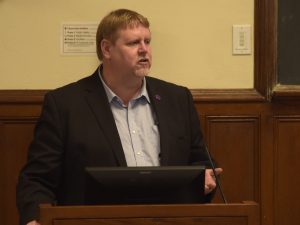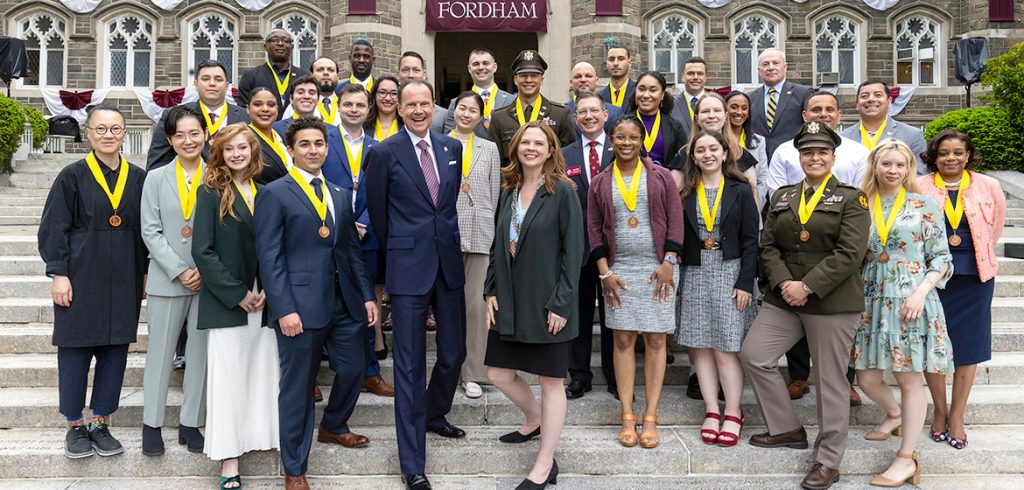
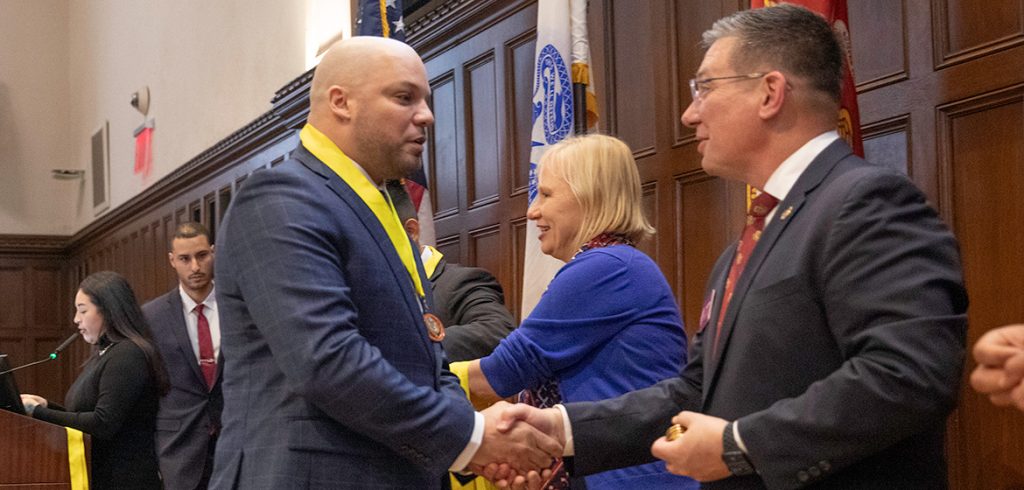
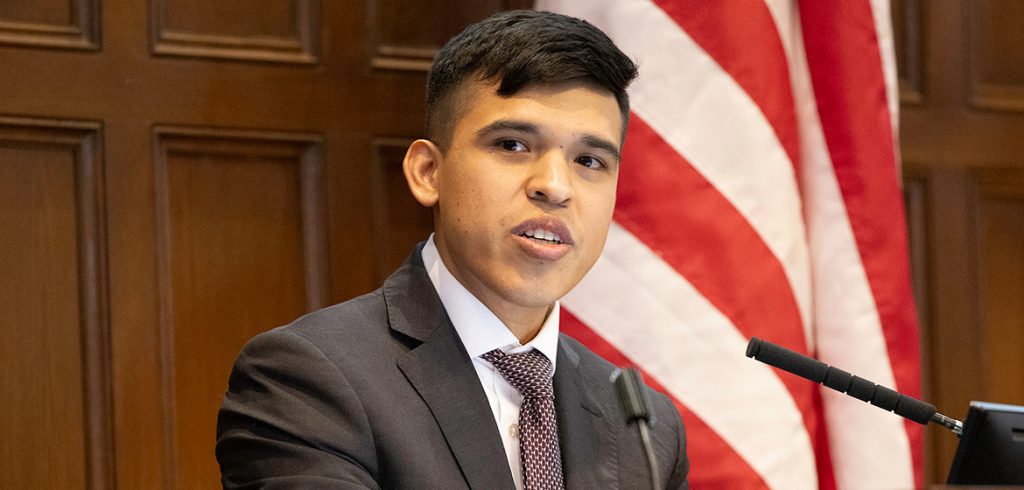
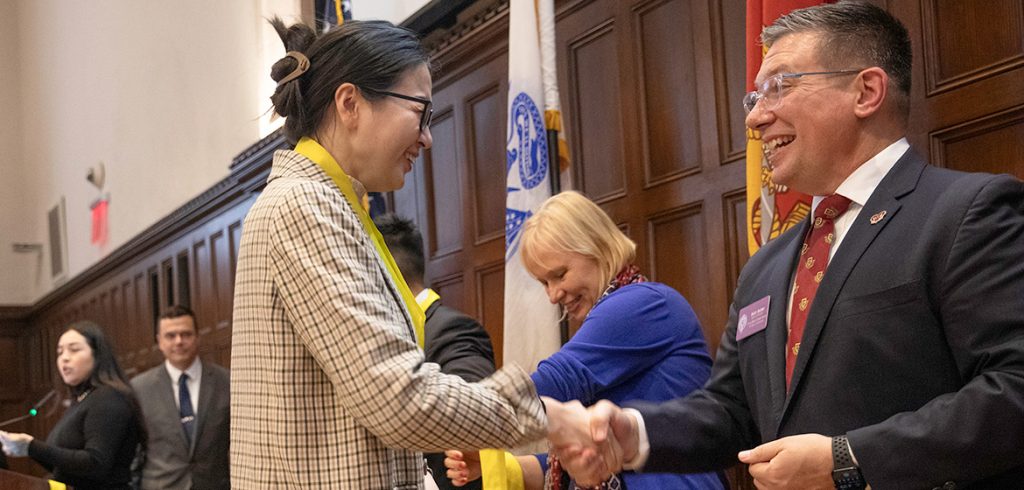
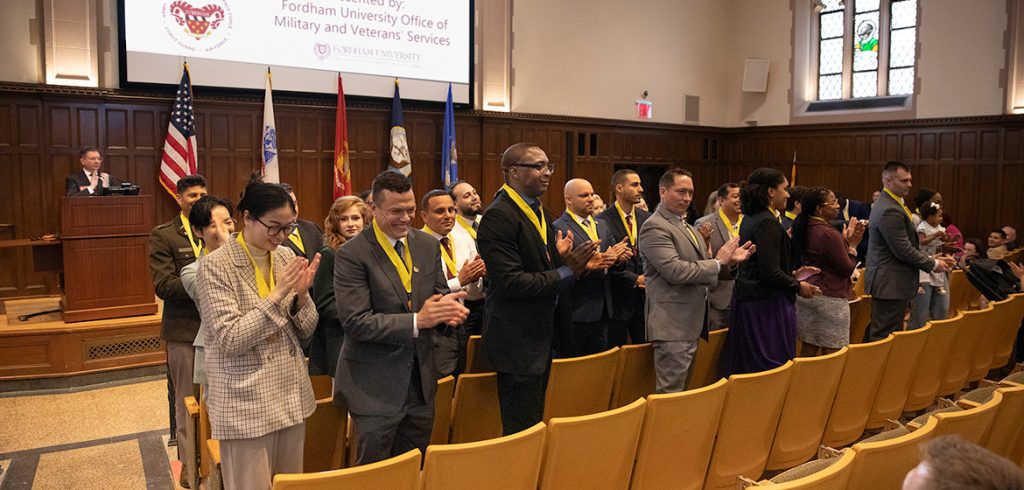
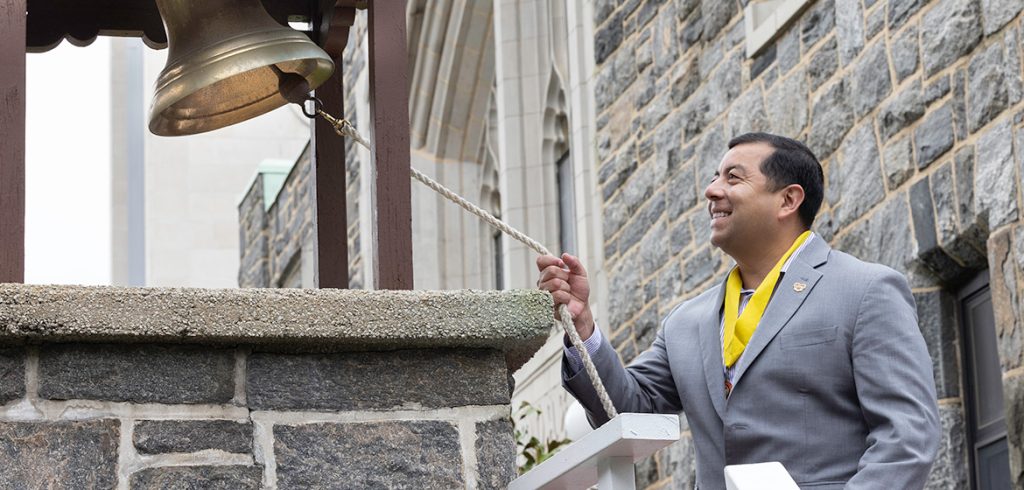
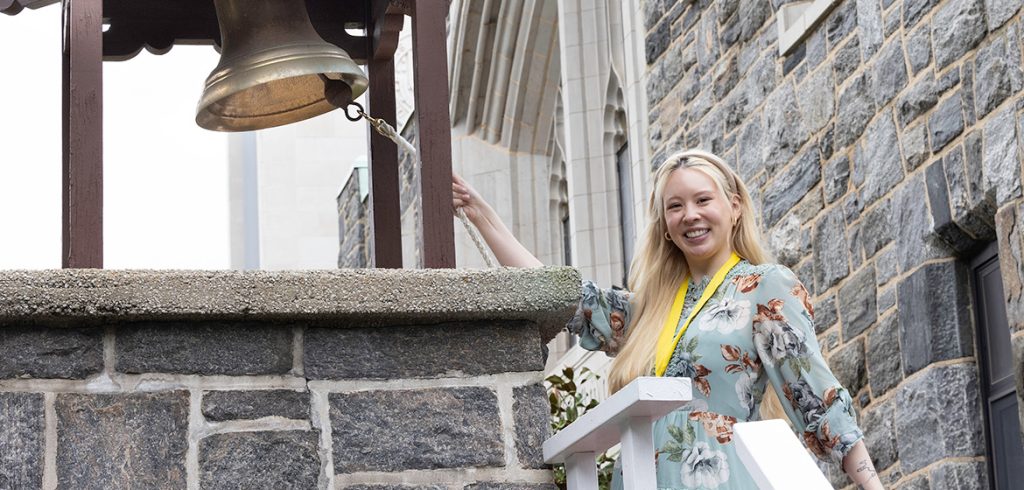
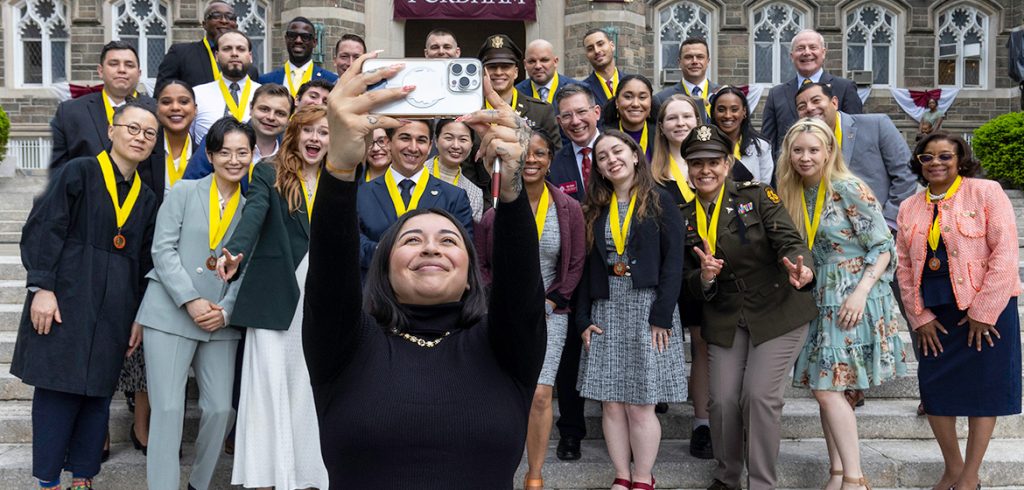
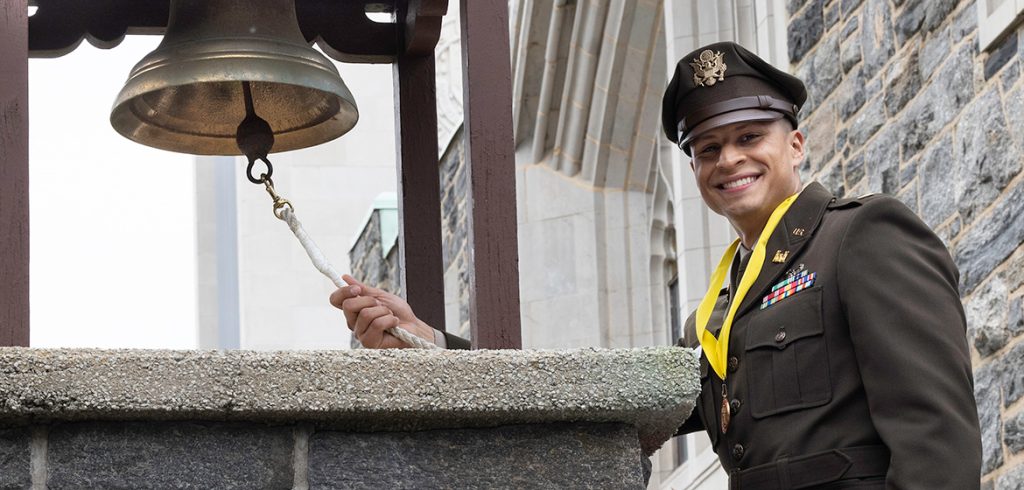
A ceremony on May 17 honored the unique experience of student veterans as well as the character they’ve shown in pursuing their Fordham degrees—which they would earn the following day, at Fordham’s 179th Annual Commencement.
“Think back to when you first made the decision to continue your education. It likely wasn’t an easy choice,” said Robert Molina, PCS ’18, a onetime student veteran and 2023 Harvard Law graduate, at the annual Yellow Ribbon and Bell Ringing Ceremony.
“Many of you juggled the demands of work, family, and studies while navigating the transition to civilian life,” Molina said. “But you persevered. You showed up, day after day, to achieve this goal.”
“The discipline, leadership, and problem-solving skills you developed in the military have served you well,” he said.
At the ceremony, held every year at the Rose Hill campus, 29 graduating student veterans and military-connected students each received a Yellow Ribbon medallion and got a chance to ring the nearby Victory Bell in celebration of their achievement. The honorees included 2nd Lt. Miguel-Angel Sandoval, PCS ’24, a former Army enlisted man who had earned his gold bars at Fordham’s ROTC commissioning ceremony that very morning.
Fordham’s president, Tania Tetlow, and Armando Nuñez, chairman of the University Board of Trustees, also showed up to offer the graduates their congratulations.
‘Something About the Atmosphere Here’
In his remarks, Molina recounted an experience that is common to student vets: serving for years in the military—in his case, for three years in the U.S. Marine Corps—and initially feeling out of place among students in their late teens who had only recently been in high school. “Like St. Thomas Aquinas, we were all adult learners,” he said.
Soon, however, the required philosophy and theology courses piqued his interest in Christianity, and he eventually took advantage of the Order of Christian Initiation for Adults offered by Campus Ministry.
And he absorbed the ethos of Fordham in other ways. “Something about the atmosphere here—the reverence in the campus chapel, the community service rooted in Catholic social teaching—it all spoke to me in a way I couldn’t quite explain,” he said.
He said the student veterans, educated in Fordham’s Jesuit tradition, are prepared to address the current “division, mistrust, and self-interest [that]too often overshadow the common good.”
He remains active with the Student Veterans of America at Fordham and urged the student veterans to help others like themselves.
“Never forget the sacrifices you and your fellow service members have made,” he said, according to prepared remarks. “Use that experience to be a leader in your community, to advocate for causes important to you, and to inspire the next generation of veterans to pursue their education and dreams.”
]]>On Nov. 2 at Keating Hall, the Fordham Veterans Association hosted two executive leaders from Student Veterans of America (SVA), a nonprofit organization that aids more than 1,500 colleges and 700,000 student veterans across the country. James Schmeling, SVA’s executive vice president, and Jared Lyon, SVA’s president and CEO, gave a talk geared toward faculty and staff at Fordham, which is home to around 500 student veterans and veteran dependants.
The day’s lecture was a personal topic for many in the room, including Matthew Butler, PCS ’16, director of Military and Veterans’ Services at Fordham and a former Marine, and the two guest speakers—both of whom are first-generation college students who served in the military. And, said Butler, who introduced the talk, it was also a chance to remember Fordham’s veterans who died nearly a century ago.
“I would be remiss if I didn’t take a moment to draw your attention to the armistice signed on November 11, 1918—a hundred years ago. I draw your attention to the armistice because of the men from Fordham University who joined the fight in Europe during World War I,” Butler said.
“Several of them didn’t come home … Those service members who fought in the war to end all wars are why we are here today.”
Facts and Figures
Schmeling spoke about the post-9/11 veteran population, their challenges with returning to civilian life, and how colleges and universities can benefit from having veterans in their student body.
“Forty-six percent of post-9/11 veterans are somewhere between 18 and 34,” he said. “That’s the population that’s returning to school.”
These veterans face a variety of challenges when they leave the military: navigating their veterans benefits, finding a job, acclimating to a non-combatant life, struggling with finances, and understanding how to apply their military skills to their new jobs, Schmeling said. But they’re also better students than most people might imagine.
On average, post-9/11 veterans achieve higher educational attainment than earlier generations and the general U.S. population, he said. Forty-one percent of post-9/11 veterans have a college or associate degree. On the other hand, only 28 percent of the total U.S. population have that same level of education. Many student veterans are well-educated, Schmeling said—but most people don’t think they are.
“I’ve just given you the data and the facts,” said Schmeling, who sourced statistics from the Bureau of Labor Statistics, the U.S. Department of Veterans Affairs, the U.S. Census Bureau, journal studies, and information collected in a collaboration between SVA and the Institute for Veterans and Military Veterans at Syracuse University. Then he paused.
“But these,” he said, introducing his next topic, “are the perceptions. And these perceptions are what are really, really important.”
Fighting Commonly Held Perceptions
Schmeling addressed common perceptions held by veterans, non-veterans, employers, educators, and military spouses. He showed the audience several bar graphs from the 2018 Veterans’ Well-Being Survey, a study of more than 4,500 veterans and non-veterans conducted by Edelman Intelligence, a global communications marketing firm.
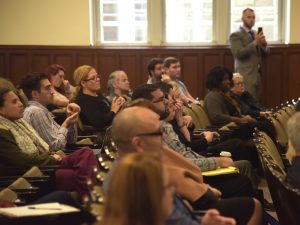
Majorities from each population indicated that that they think veterans are more than or equally likely to obtain a bachelor’s degree as non-veterans, he said. However, the same is not true for advanced degrees.
A whopping 70 percent of military spouses said they believe military veterans are less likely than the average citizen to obtain a degree ranked around a Ph.D.
He also noted that 53 percent of employers believe that, compared to non-veterans, most veterans do not have successful careers after they leave military service. And barely half of veterans themselves believe that the majority of veterans have successful careers post-military service.
From Combat to Campus
But student veterans have both facts and data on their side. They’re not only college material—they’re an asset to college classrooms, Schmeling argued.
First off, student veterans aren’t likely to incur much debt. As of May 2018, the post-9/11 G.I. Bill/ Yellow Ribbon program has funded $75 billion for veterans’ tuition, fees, book stipends, and housing allowance, he said. Fordham’s commitment to the Yellow Ribbon program guarantees that all tuition and fees are fully covered for admitted eligible veterans.
Student veterans also bring diversity in age, ethnicity, marital status, and disabilities. In addition, they possess military-honed skills that can transfer to their studies and future jobs: work ethic and discipline, mental toughness, teamwork. And on average, he added, student veterans have a higher GPA than traditional students at four-year-degree-granting institutions nationwide.
“This is contrary to the picture that the media paints—of homelessness, of PTSD, of workplace violence, among other sorts of things,” he said. “Why is that? Well—what sells? A negative story, right?”
Veterans typically do best in colleges and universities that have a good peer support system, advisors, and networking opportunities, Schmeling and Lyon said.
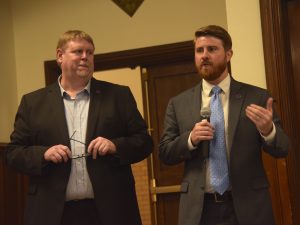
“The number one thing we can provide a student veteran—if you give them this one thing, they’re three times more likely to graduate than anything else—shocks a lot of people. It’s a peer. It’s a friend—someone you can relate to firsthand in that college environment,” Lyon said.
“I started my undergraduate experience at the age of 28 years old at Florida State University,” he said. “And as I looked across a sea of 42,000 undergraduates … I mean, one of these things was not like the other. And that was me.”
Schmeling added that many student veterans he’s spoken with, especially first-generation college students, had no idea they could graduate from college after serving in the military.
“They had no idea they could thrive in an environment like Fordham,” he said. “If you tell them that they can be successful, we convince them that they can be successful, and we continue to invite them to our campuses, they will be successful.”
Anna Ponterosso, university registrar and director of academic records, said she found the lecture to be informative.
Feature photo: Shutterstock; Other photos: Taylor Ha
]]>Today there are more than 400, said Matthew Butler, PCS ’16, the newly appointed director of a campuswide veterans support program, Military and Veterans Affairs.
Butler, a former Marine and graduate of the School of Professional and Continuing Studies (PCS), is the first to fill the new role. In his new position, he will help coordinate veterans services on all three campuses—from writer’s workshops in Westchester to a Fleet Week Career Fair to be held on Memorial Day weekend at the Lincoln Center campus.
Butler said there are many reasons for the surge in veterans enrollment at the University, not the least of which was the Post 9/11 GI Bill and Fordham’s participation in the Yellow Ribbon Program. In addition, the University picks up the cost of fees not covered by the Department of Veterans Affairs.
As a student majoring in organizational leadership at the PCS, Butler said he detected a veteran’s theme when he read the story of Homer returning to Troy in the Odyssey.
“I was taken aback,” he said. “This is a guy that’s dealing with PTSD. His experience was life altering and couldn’t be ignored, and there were lots of examples where people didn’t understand him when he was trying to relate to them. It felt familiar.”
In his new role, Butler will bring all the veterans groups, whether for business students, law students, or alumni, under one umbrella organization, the Fordham Veterans Association. He hopes to create a unified veterans voice for all campuses.
Butler said he understands firsthand the difficulty of transitioning back to civilian life.
“When you join the military, you become part of something that is greater than yourself,” he said. “When you leave, it becomes about trying to find your way back to home. But it’s never the same.”
He believes that higher education is the best way forward for most veterans.
“Higher ed helps because it gives you the opportunity to solidify the skills you gained in the military.”
Most veterans think that what they did in the military is ordinary, he said, because so many of their colleagues performed similar functions. But operating equipment worth tens of millions of dollars is hardly an everyday experience for a person in their early twenties, nor is living overseas as many veterans do.
“When you combine that extraordinary experience and discipline with the resources from the University, like our corporate partners, then you can graduate someone that companies want to hire,” he said.
He noted that veterans bring a worldly perspective to their classroom peers, enriching class dialogue and creating greater understanding among veterans and civilians. This is true especially with regard to many misconceptions that compound transitioning to civilian life.
“There are so many stereotypes about vets, and a lack of understanding about what those serving actually do on a daily basis,” he said, noting that only 12 percent of veterans see combat. “PTSD is not specific just to combat; it happens in other situations, like transitioning to New York City from an Air Force base in Japan.
“It’s like Homer’s trip back to Troy,” he said. “He finds challenges along the way and even comes home to challenges. Ours is really an epic story of trying to come back home.”
]]>The Yellow Ribbon cohort comprised the largest group of veterans to graduate from Fordham to date.
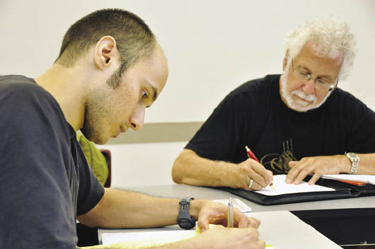
Photo by Janet Sassi
“We’ve had student veterans graduate previously, but this is the first substantial graduating group,” said Michael Gillan, Ph.D., associate vice president at the Lincoln Center campus and co-chair of the FordhamVets Task Group.
In the last three years, the number of student veterans has steadily increased, owing to the 2009 launch of the Fordham University Veterans Initiative (FordhamVets), which offers services to help veterans transition from the military to college life.
Whereas the number of veterans enrolled prior to 2009 averaged around 30, nearly ten times that number of veterans and their dependents have since come to Fordham, with the spring 2012 enrollment reaching 265. According to Gillan, the group anticipates that number will climb to 300 in the upcoming academic year.
Moreover, in the last year Fordham leapt from No. 55 to No. 34 in Military Times EDGE magazine’s national list of the top 100 “veteran friendly” colleges and universities—the only New York City university in the top 50.
“It’s not by accident that we became nationally ranked,” Gillan said. “We’ve prepared ourselves to do a good job with the veterans that come to us, and we’ve taken steps through publicity and other materials to let them know that we are prepared to welcome them when they arrive.”
The FordhamVets Initiative was established in response to the Post-9/11 GI Bill, which provides financial assistance and housing to veterans pursuing education. Included in the Bill is the Yellow Ribbon Program, through which colleges and universities can voluntarily fund up to 50 percent of tuition and fees not covered by the Bill’s basic provision of $17,500. The Department of Veteran Affairs then matches the school’s contribution.
Fordham contributes the maximum amount—50 percent—and also does not cap the number of veterans who can benefit from the program.
“Thanks to Father McShane, Fordham was one of the first universities to announce that it would participate in this Yellow Ribbon program to the fullest extent,” Gillan said. “It was from the onset an institutional commitment across a lot of offices and a lot of people to bring these young men and women to us, and has resulted in our being able to serve them well.”
Marco Bongioanni, who enrolled in the Graduate School of Education (GSE) after serving two tours with the Army in Iraq, said the program has supported him throughout his education at Fordham.
“Three years ago, I did not have the slightest idea that I would complete such a program,” Bongioanni said. “But Fordham gave me the tools and professional training to allow me to pursue a career helping other veterans.”
Bongioanni graduated with a master’s in education from GSE’s Mental Health Counseling program, which he will use to help others who have been in his position.
“I would like to work the veteran community, especially those suffering from post-traumatic stress disorder,” he said.
In addition to supporting students financially, FordhamVets runs various workshops and seminars to help veterans move “from desert to desk,” Gillan said. In the fall, GSE’s Human Resiliency Institute implemented Edge4Vets, a workshop series that draws on principles taught in the military to help veterans acclimate to student life.
Student veterans also have access to the Veterans Writing Project, a weekly workshop that assists veterans in writing about their experiences. Free of charge to all veterans, the workshops conclude in a publication of the participants’ writings. A public reading of the latest anthology, Afterwords: The Way Home, drew a standing-room-only crowd at the Lincoln Center campus on June 7. Another series of workshops are taking place this summer on the Westchester and Lincoln Center campuses.
“It’s another example of how Fordham goes above and beyond just helping veterans who are enrolled in the school,” Bongioanni said.
Despite arriving with some anxiety about adjusting to college, the veterans who passed through the program have thrived, Gillan said, and their experiences at Fordham have become a launching pad for further academic and personal growth.
“The change I see is in their sense of confidence in this undertaking and their sense that the sky’s the limit,” Gillan said.
]]>
Fordham is a Yellow Ribbon university (there is an open house at Fordham Westchester this evening). The FordhamVets program ensures that the University is as veterans-friendly as possible. Fordham participates in the Yellow Ribbon Program on all campuses, which covers all tuition and fees for Post 9/11 veterans with full benefit eligibility: http://www.fordham.edu/vets
Contact Lynne O’Connell: (914) 367-3322, [email protected]
]]>